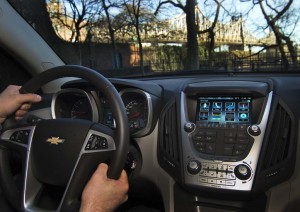Facing intense criticism from Capitol Hill and calls for a government investigation, General Motors’ OnStar division has dropped plans that would have allowed it to track detailed personal driving information about both current and former subscribers.
The telematics subsidiary had advised users that it was changing its Terms and Conditions to permit it to track a vehicle’s speed, location and other data including whether or not a motorist was wearing a seatbelt. A driver who dropped OnStar would still be linked to the service unless specifically opting out. And the company said it reserved the right to sell that information to third-party marketers or even government and law enforcement agencies.
New York’s powerful Democratic Sen. Charles Schumer termed the move a “brazen” invasion of privacy and called for an investigation by the Federal Trade Commission. Facing mounting criticism from other government and private quarters, OnStar said it has canceled its policy change and will not maintain a link to customers who quit the service.
“We realize that our proposed amendments did not satisfy our subscribers,” said OnStar President Linda Marshall in a prepared statement. “This is why we are leaving the decision in our customers’ hands. We listened, we responded and we hope to maintain the trust of our more than 6 million customers.”
The company continued to defend its initial plans, insisting they would have given OnStar the ability to send emergency messages to even those no longer subscribing to the service in the event, it suggested, of a tornado or other serious storm.
Going forward, Marshall noted, a link will be maintained only if a customer opts in voluntarily. And then, OnStar would “honor customer references” as to how it might use any data it collects.
The company notably did not say it would reverse its plans to be able to sell data collected from existing subscribers, however. The GM unit could track a vehicle’s speed, for example, as well as its location. Though OnStar officials insist they currently have no plans to do so such data might be sold to a marketer interested in reaching motorists who might be passing a shopping mall, or to pitch a nearby brand of gasoline.
OnStar currently claims 6 million active subscribers. The service is offered free for a limited time with most new General Motors vehicles sold in the U.S. The telematics company has traditionally focused on safety and security issues, such as automatic emergency responder notification in case of a serious crash. But it has been expanding into other areas to remain competitive with other telematics firms, such as Ford’s popular Sync system.


I’ve always wondered when OnStar opens communication with you is there a light that comes on so you know you are connected or can OnStar just listen in on you without you knowing it? Anyone?
Hi,
I have contacted OnStar PR and asked the following:
1) Is the little light that one sees when they call OnStar ALWAYS illuminated when the vehicle has an open link — either voice OR data — to OnStar?
2) Can the service listen in without a customer being aware?
3) I believe OnStar CAN initiate a connection in the event of an accident. (I was previously told that an operator might do this if the crash response system triggers and they might listen to see, ie, if a motorist were incapacitated and unable to verbally respond, say, if knocked unconscious. Would such an even cause the light to illuminate?
4) Since OnStar can go in and access data, ie odometer, whether seatbelts are being used, etc., would that also trigger a light or would that be done without any indication to the customer?
I will advise when we get an answer.
Paul A. Eisenstein
Publisher, TheDetroitBureau.com
Thanks Paul, I’m sure I’m not the only one who would like to know this.